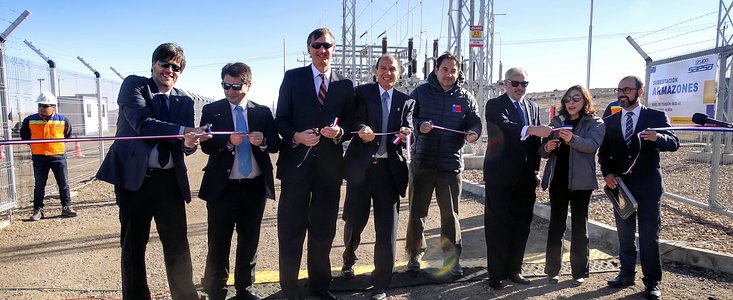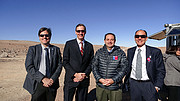Tiedote
Chilen energiaministeri liittää Paranalin kansalliseen sähköverkkoon
4. elokuuta 2017
Chilen energiaministeri, Andres Rebolledo, osallistui äskettäin seremoniaan, joka juhlisti ESO:n Paranal- ja Armazones-alueiden yhdistymistä Chilen kansalliseen sähköverkkoon, jälkimmäisen ollessa paikka, jossa Extreme Large Telescope (ELT) tulee sijaitsemaan. Uusi sähköenergianlähde tulee alentamaan kustannuksia ja pienentämään observatorion hiilijalanjälkeä.
Ministeri Rebolledo huomioi edistyksen tärkeyttä esimerkkinä Chilen kansallisen sähköverkon valmiudesta, sekä sen kyvystä tuottaa turvallinen ja korkealaatuinen energianlähde viimeisimmän teknologian astronomiselle tutkimukselle.
Roberto Tamai, ELT-ohjelman johtaja, joka toimi projektin johtajana tälle ESO:n päivitykselle, kiitti Chilen hallitusta ja instituutioita avustaan sellaisen energia-infrastruktuurin rakentamisessa, joka tulee tukemaan edistystä ELT-työmaalla. 39-metrisellä pääpeilillään ELT:n rakennus on vaativa teknologinen ja konetekninen haaste. Tamait korosti sitä, että sähkönjakelu on avainasemassa infrastruktuurissa, joka antaa meille mahdollisuudet tarkastella painavimpia kysymyksiä: Mistä saimme alkumme? Minne päädymme? Olemmeko yksin universumissa?
Paranal- ja Armazones-alueiden yhdistyminen Chilen sähköverkkoon mahdollistettiin Grupo SAESA:n avulla. Se on yritys, joka on nyt vastuussa pysyvän ja riittävän energian jakelusta Paranelin observatoriolle ja ELT-työmaalle. Työmaan ollessa hyvin eristäytynyt, 130 kilometriä Antofagastasta keskellä Atacaman aavikkoa, projektissa ilmaantui merkittäviä haasteita, mutta se valmistui kuitenkin onnistuneesti, mikä on yli 300 työntekijän ponnistusten tulos. Tuloksiin lukeutuu 50 kilometriä pitkä 66-kilovoltin lähetysjärjestelmä, johon kuulu kaksi uutta sähköasemaa: yksi Paposolla (220/66kV), nimeltään Paranalin sähköasema, sekä toinen Paranalin ja Armazonesin välissä (66/23kV), nimeltään Armazonesin sähköasema.
Yhdistyminen pienentää Paranal- ja Armazones-alueiden hiilijalanjälkeä, sillä ne eivät enää tule käyttämään fossiilisia polttoaineita generaattoreissaan energian tuottamiseksi. Puheessaan Roberto Tamai huomautti, että sähköverkon laajennuksen lisähyötynä runsasta auringonvaloa voidaan käyttää hyväksi puhtaan energian tuottamisessa, jota taas puolestaan voidaan syöttää kansalliseen sähköverkkoon.
ELT tulee käyttämään Universumia äärimmäisenä tieteellisenä laboratoriona, tehden havaintoja tällä hetkellä saavuttamattomista havaintokohteista Maassa olevilla teleskoopeilla, vastatakseen aikamme vaativimpiin astronomisiin kysymyksiin. ELT:n oletetaan näkevän ensimmäisen valon vuonna 2024.
Lisätietoja
ESO on Euroopan johtava hallitustenvälinen tähtitieteen organisaatio ja maailman tieteellisesti tuotteliain tähtitieteellinen observatorio. ESO:lla on 16 jäsenmaata: Alankomaat, Belgia, Brasilia, Espanja, Iso-Britannia, Italia, Itävalta, Portugali, Puola, Ranska, Ruotsi, Saksa, Suomi, Sveitsi, Tanska ja Tšekin tasavalta. ESO toteuttaa kunnianhimoista ohjelmaa, joka keskittyy tehokkaiden maanpäällisten havaintovälineiden suunnitteluun, rakentamiseen ja käyttöön. Välineiden avulla tähtitieteilijät voivat tehdä merkittäviä tieteellisiä löytöjä. ESO:lla on myös johtava asema tähtitieteen tutkimuksen kansainvälisen yhteistyön edistämisessä ja organisoinnissa. ESO:lla on Chilessä kolme ainutlaatuista huippuluokan observatoriota: La Silla, Paranal ja Chajnantor. ESO:lla on Paranalilla Very Large Telescope (VLT), maailman kehittynein näkyvää valoa havainnoiva tähtitieteellinen observatorio, ja kaksi kartoitusteleskooppia. VISTA toimii infrapuna-alueella ja on maailman suurin kartoitusteleskooppi. VLT Survey Telescope on suurin vartavasten taivaan näkyvän valon kartoitukseen suunniteltu teleskooppi. ESO on yksi maailman suurimman tähtitieteellisen projektin, ALMA-teleskoopin pääyhteistyökumppaneista. Lähellä Paranalia sijaitsevalla Cerro Armazonesilla ESO rakentaa 39-metrin kokoista ELT -teleskooppia (Extremely Large Telescope), josta tulee “maailman suurin tähtitaivasta havainnoiva silmä”.
Linkit
- Kartta, missä näkyy Paranalin ja Armazonesin verkkojen yhteydet
- Tietoa 'Green ESO':sta
- Lue lisää ELT:stä ESO:n verkkosivuilta
- Viimeisimmät uutiset ja lehdistötiedoitteet ELT:stä
- ELT FAQ-sivu
- Kuvia ja videoita ELT:stä
- Roberto Tamain puhe (vain espanjaksi)
Yhteystiedot
Richard Hook
ESO Public Information Officer
Garching bei München, Germany
Puh.: +49 89 3200 6655
S-posti: rhook@eso.org
Tiedotteesta
| Tunnistus: | ann17049 |
Our use of Cookies
We use cookies that are essential for accessing our websites and using our services. We also use cookies to analyse, measure and improve our websites’ performance, to enable content sharing via social media and to display media content hosted on third-party platforms.
ESO Cookies Policy
The European Organisation for Astronomical Research in the Southern Hemisphere (ESO) is the pre-eminent intergovernmental science and technology organisation in astronomy. It carries out an ambitious programme focused on the design, construction and operation of powerful ground-based observing facilities for astronomy.
This Cookies Policy is intended to provide clarity by outlining the cookies used on the ESO public websites, their functions, the options you have for controlling them, and the ways you can contact us for additional details.
What are cookies?
Cookies are small pieces of data stored on your device by websites you visit. They serve various purposes, such as remembering login credentials and preferences and enhance your browsing experience.
Categories of cookies we use
Essential cookies (always active): These cookies are strictly necessary for the proper functioning of our website. Without these cookies, the website cannot operate correctly, and certain services, such as logging in or accessing secure areas, may not be available; because they are essential for the website’s operation, they cannot be disabled.
Functional Cookies: These cookies enhance your browsing experience by enabling additional features and personalization, such as remembering your preferences and settings. While not strictly necessary for the website to function, they improve usability and convenience; these cookies are only placed if you provide your consent.
Analytics cookies: These cookies collect information about how visitors interact with our website, such as which pages are visited most often and how users navigate the site. This data helps us improve website performance, optimize content, and enhance the user experience; these cookies are only placed if you provide your consent. We use the following analytics cookies.
Matomo Cookies:
This website uses Matomo (formerly Piwik), an open source software which enables the statistical analysis of website visits. Matomo uses cookies (text files) which are saved on your computer and which allow us to analyze how you use our website. The website user information generated by the cookies will only be saved on the servers of our IT Department. We use this information to analyze www.eso.org visits and to prepare reports on website activities. These data will not be disclosed to third parties.
On behalf of ESO, Matomo will use this information for the purpose of evaluating your use of the website, compiling reports on website activity and providing other services relating to website activity and internet usage.
Matomo cookies settings:
Additional Third-party cookies on ESO websites: some of our pages display content from external providers, e.g. YouTube.
Such third-party services are outside of ESO control and may, at any time, change their terms of service, use of cookies, etc.
YouTube: Some videos on the ESO website are embedded from ESO’s official YouTube channel. We have enabled YouTube’s privacy-enhanced mode, meaning that no cookies are set unless the user actively clicks on the video to play it. Additionally, in this mode, YouTube does not store any personally identifiable cookie data for embedded video playbacks. For more details, please refer to YouTube’s embedding videos information page.
Cookies can also be classified based on the following elements.
Regarding the domain, there are:
- First-party cookies, set by the website you are currently visiting. They are stored by the same domain that you are browsing and are used to enhance your experience on that site;
- Third-party cookies, set by a domain other than the one you are currently visiting.
As for their duration, cookies can be:
- Browser-session cookies, which are deleted when the user closes the browser;
- Stored cookies, which stay on the user's device for a predetermined period of time.
How to manage cookies
Cookie settings: You can modify your cookie choices for the ESO webpages at any time by clicking on the link Cookie settings at the bottom of any page.
In your browser: If you wish to delete cookies or instruct your browser to delete or block cookies by default, please visit the help pages of your browser:
Please be aware that if you delete or decline cookies, certain functionalities of our website may be not be available and your browsing experience may be affected.
You can set most browsers to prevent any cookies being placed on your device, but you may then have to manually adjust some preferences every time you visit a site/page. And some services and functionalities may not work properly at all (e.g. profile logging-in, shop check out).
Updates to the ESO Cookies Policy
The ESO Cookies Policy may be subject to future updates, which will be made available on this page.
Additional information
For any queries related to cookies, please contact: pdprATesoDOTorg.
As ESO public webpages are managed by our Department of Communication, your questions will be dealt with the support of the said Department.


